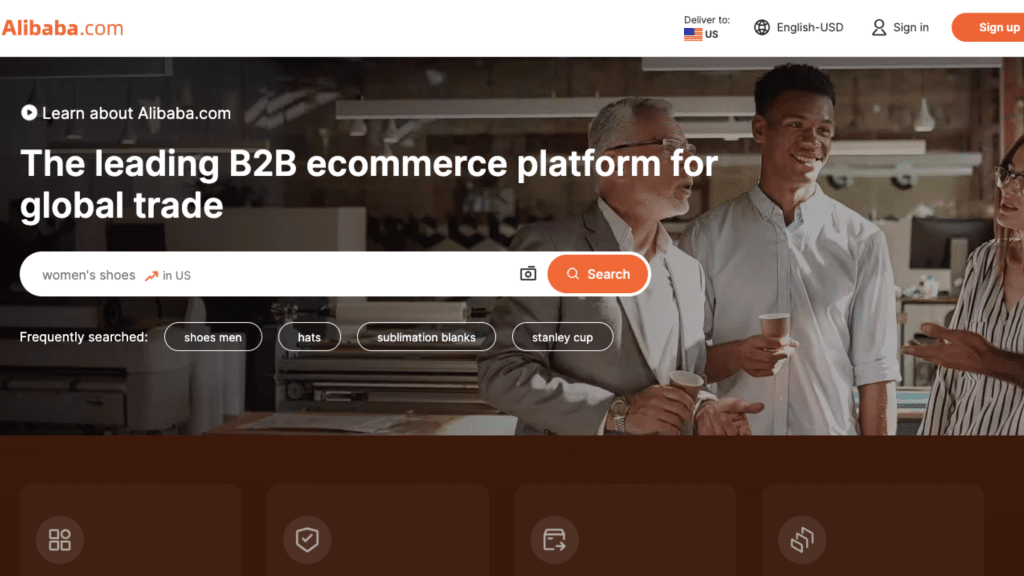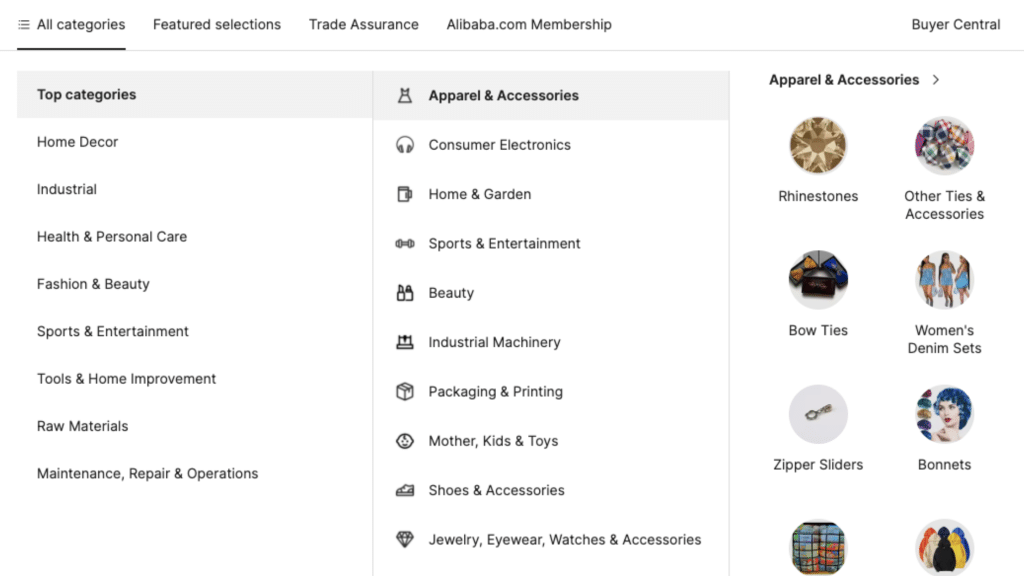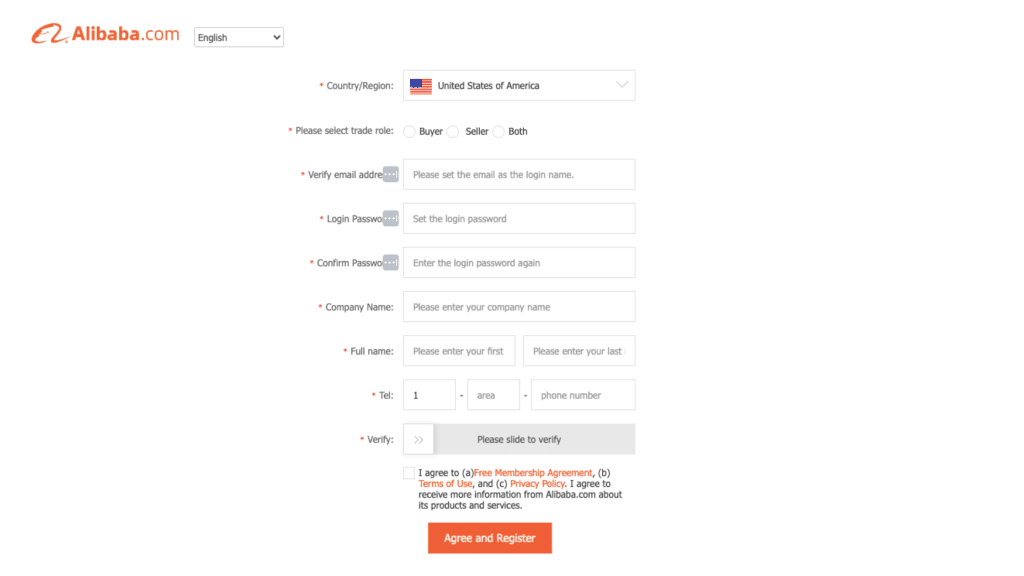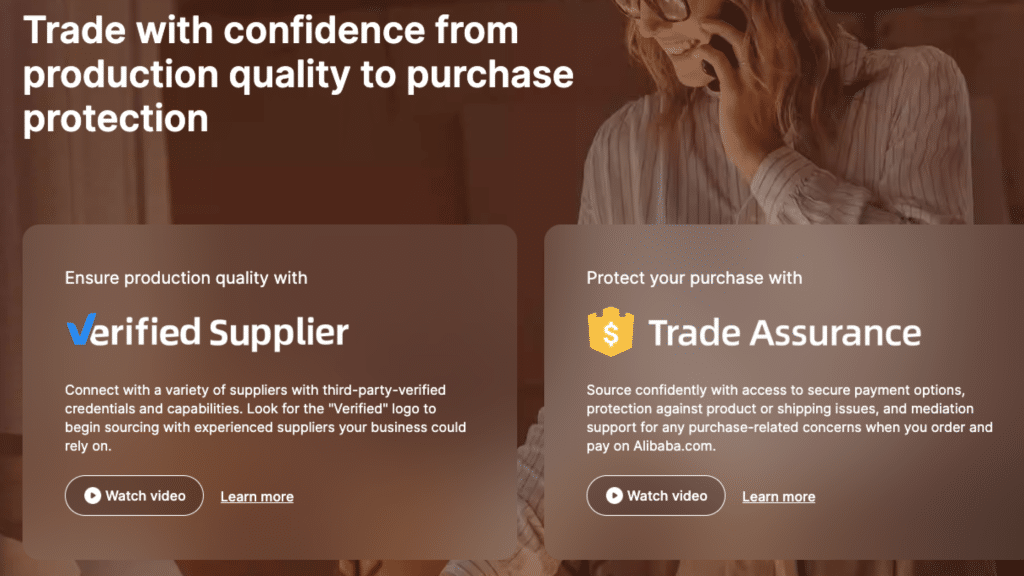Alibaba has everything you could ask for. It’s not hard to see why some sellers want to use it as a way to find product suppliers. However, there are a few things to consider if you are wondering how to sell on Amazon from Alibaba.
Quick spoiler: it is not as easy as shipping directly from Alibaba to Amazon customers, but it is possible. Below, we’ll help you understand how to sell on Amazon from Alibaba.
How Does Alibaba Work?
Alibaba is a well-known Chinese ecommerce company with approximately 903 million users. It was founded back in 1999 by Jack Ma and his team.
Alibaba started off as a business-to-business (B2B) platform, connecting manufacturers and wholesalers with buyers around the world. Over time, Alibaba expanded its services to include a business-to-consumer (B2C) with AliExpress, and consumer-to-consumer (C2C) with Taobao.
Here’s how Alibaba works. Suppliers list their products and buyers can browse these listings, compare prices, and communicate directly with suppliers. Alibaba facilitates transactions through its secure payment system, ensuring a safe exchange between all parties.
Additionally, Alibaba’s platform often handles shipping and logistics, making it easier for international buyers to receive their orders.
Are Amazon and Alibaba Compatible?
Amazon and Alibaba don’t work together for dropshipping, meaning that you can’t buy products from Alibaba and send them directly to Amazon customers. However, if you think Alibaba is the platform you want to go for to find a supplier, you can still use Alibaba to supply products for selling on Amazon through FBA.
Alibaba’s Pros and Cons
Pros
- Sellers choose Alibaba because it offers low-priced products, which helps to save money and boost profits.
- The platform connects sellers with suppliers from all over the world, making it easy to find a wide variety of products in large quantities.
- Sellers also appreciate the ability to customize products and add their own brand names, giving them more control over what they sell.
- On Alibaba, sellers can communicate directly with manufacturers, which can lead to better relationships and the option to make custom orders.
- The platform also helps sellers find suppliers who can ship products directly to customers. This makes it easier to sell without needing to keep lots of inventory on hand.
- For added safety, Alibaba checks its suppliers to make sure they are trustworthy by implementing a Verified Suppliers program.
- Sellers can use Alibaba’s sister site, AliExpress, to test products with small orders before buying in bulk. You should always be cautious to avoid scams or other problems.
Cons
- One of the main concerns is the potential for scams or fraudulent suppliers. Sellers need to be diligent in vetting suppliers and verifying their legitimacy to avoid falling victim to scams.
- Another issue is the language barrier, as not all suppliers may speak fluent English, which can sometimes lead to communication challenges.
- Additionally, shipping and delivery times can vary widely, especially when ordering from international suppliers. This can result in longer wait times for products to arrive, which may not meet the expectations of customers.
- Returns and customer service can also be more complicated when dealing with overseas suppliers, making it essential for sellers to have clear policies in place.
How to Buy from Alibaba and Sell on Amazon
Now you know a lot more about Amazon and Alibaba, you need some information on what to do to make the most out of them. If you have decided to sell Alibaba products on Amazon, these are some of the steps you should be taking:
Research and Identify Products
The first thing you need to do is find what you will sell, so it is time to do some reverse sourcing. Go to Amazon and look for items with positive reviews, indicating customer satisfaction, and ensure they are not oversaturated in the market.
Create an Amazon Seller Account
If you don’t have an Amazon Seller account yet, sign up for one. Amazon offers two types of accounts: Individual and Professional. Choose the one that aligns with your sales volume and business needs.
Follow Amazon’s setup instructions, which include entering your business information and payment details.
Create an Account on Alibaba
Visit Alibaba’s website and sign up as a buyer. Creating an account grants you access to a vast network of suppliers offering a diverse range of products. To build trust with suppliers and unlock additional platform features, remember to verify your account.
Search for Suppliers
Once your Alibaba account is ready, it is time to start your wholesale product sourcing to find those suppliers that offer the products you are looking for. Use specific keywords and set on all the filters you can to narrow down the search.
Before choosing a supplier, check their ratings and read reviews from other buyers to make sure they’re reliable. Also, you want to make sure that you are taking all the steps to directly verify if their business is legit.
Ask detailed questions about their overall business, as well as specifics about their products. Do not hesitate to request a copy of their business license, email and a phone number to make sure it’s all legit.
When comparing prices from different suppliers, remember to consider additional costs like shipping fees. Don’t be afraid to negotiate terms with suppliers to get the best deal possible.
Request Samples
It is always a good idea to request product samples from potential suppliers. This step allows you to evaluate products’ quality firsthand and confirm that they meet your standards before selling them to customers.
Negotiate Terms
After reviewing the samples and ensuring their quality, you can initiate negotiations with the supplier. Discuss various aspects such as pricing, minimum order quantities, shipping methods, and any other specifics crucial to your business.
Also, before finalizing your product choice, check if there are any legal requirements or restrictions for importing the product into your country.
Place Your First Order
When it comes to shipping products from Alibaba to Amazon, you have two options:
- Supplier-arranged shipping is more convenient as the supplier manages the logistics, but you might have less control over the shipping process.
- Self-arranged shipping allows you to hire a freight forwarder or use a third-party logistics (3PL) provider, giving you greater control over the shipping process.
Choose the method that best suits your needs and ensures your products reach Amazon’s fulfillment centers safely and on time.
List Your Products on Amazon
With your products ready to go, it’s time to list them on Amazon. Craft engaging product listings featuring high-resolution images and comprehensive descriptions to captivate potential buyers and drive sales.
5 Mistakes You Should Avoid When Selling on Amazon from Alibaba
Now you have all the information you need to understand how to sell on Amazon from Alibaba, but we want to take it one step further. Here are some of the common mistakes you should avoid during this process.
Skipping Product Research
Take the time to understand if there’s a demand for the product you want to sell. Look at what customers search for, check out similar product’ reviews and analyze the competition.
This research helps you determine if the product is likely to sell, saving you from investing in items that might not attract buyers.
Choosing Unverified Suppliers
Check reviews, ask for samples, and communicate clearly about your product requirements. Working with a supplier without verifying their reliability can lead to receiving products that don’t meet your standards, delays in getting your inventory, or even losing money to scams.
Disregarding Amazon’s Policies
Amazon has rules you need to follow to build a good shopping experience for customers. These rules cover things like the quality of the products you sell, how you label them, and how you handle shipping and returns.
Ignoring these guidelines can get your seller account suspended, which means you won’t be able to sell on Amazon until the issues are resolved.
Overlooking Shipping and Logistics
Consider the entire logistics journey the product will take to reach the customer. This includes shipping costs, delivery schedules, and any customs fees you might have to pay.
Not planning for these factors can lead to unexpected costs, fulfillment delays, and unhappy customers who have to wait longer than expected.
Neglecting Customer Service
Good customer service is crucial for any successful business. Make sure you respond to customer inquiries promptly, handle returns efficiently, and resolve any issues or complaints quickly and professionally.
Poor customer service leads to negative reviews, which can hurt your seller rating and make it harder to attract sales.
Final Thoughts
Now you have all the details you need to know about how to sell products on Amazon from Alibaba. Plus, you’re now aware of some of the main things you need to avoid during the process.
If you’d like to know more about how to manage and grow your Amazon dropshipping, don’t forget to keep scrolling through our blog to learn about everything from Amazon wholesale sourcing to product listing optimization.
Author








